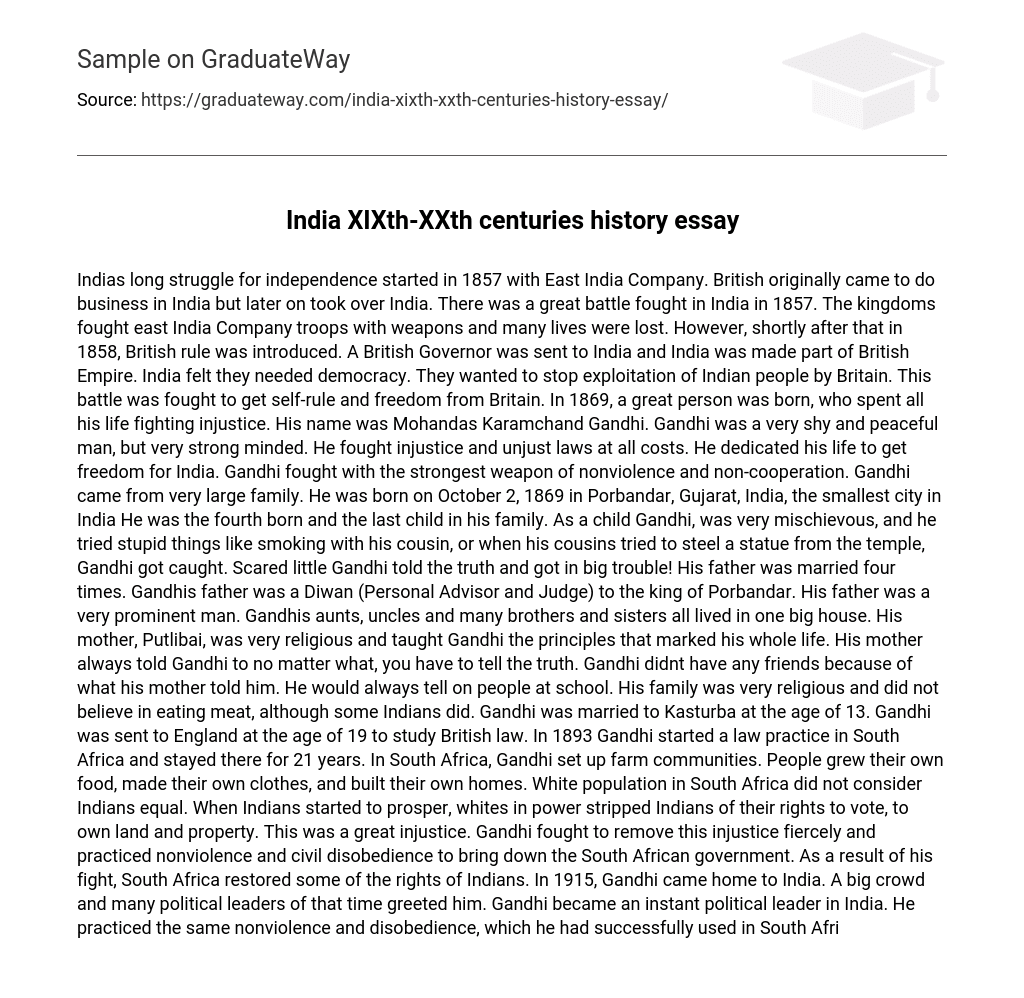The struggle for India’s independence against British rule began in 1857 when the East India Company, with business interests in India, took control. This period saw a fierce battle between kingdoms and the troops of the East India Company, resulting in many casualties. However, by 1858, British rule was established and India became part of the British Empire. As a result, Indians developed a growing desire for democracy to end exploitation by Britain. The aim of the battle fought during this time was to achieve self-rule and freedom from British dominance.
On October 2nd, 1869, Mohandas Karamchand Gandhi – an extraordinary individual dedicated to fighting against injustice – was born in Porbandar, Gujarat. He was the fourth-born and youngest child of a large family living in the smallest city in the nation. Despite his shy and peaceful nature,Gandhi possessed unwavering determination to bring freedom to India. He utilized nonviolence and non-cooperation as his most potent tools.
During his childhood years, Gandhi engaged in mischievous acts such as smoking with his cousin or getting caught when other cousins attempted to steal a statue from a temple.His honesty about his involvement resulted in significant consequences.Gandhi’s father, who had been married four times and held the position of Diwan for the king of Porbandar, played a significant role in their lives. Living in a large house with relatives and siblings, his influential father shaped Gandhi’s life. The values that would guide him were instilled by his mother, Putlibai, emphasizing truthfulness. As a result, Gandhi had no friends as he frequently reported on his schoolmates. Despite Indians consuming meat, Gandhi’s deeply religious family abstained from it. At just 13 years old, he married Kasturba and at 19 went to England to study law. After completing his studies in 1893, he started a law practice in South Africa where he lived for 21 years. There, Gandhi established agricultural communities where residents grew food and made clothes while constructing their own homes. However, the white population viewed these thriving Indian communities as inferior and deprived them of voting rights and land ownership through unjust means. This grave injustice compelled Gandhi to fiercely fight against the South African government using nonviolence and civil disobedience tactics.
Upon his return to India in 1915, Gandhi was greeted with a warm welcome from a large crowd and influential political leaders. He wasted no time in assuming a political role and applying the successful strategies of nonviolent resistance and civil disobedience that had proven effective in South Africa. In order to foster inclusivity, he founded Ashram communities throughout India, extending invitations to individuals from all social castes, including the Untouchables. Furthermore, he vehemently advocated for the adoption of spinning wheels as a means to promote self-sufficiency and resist British taxation on cotton production.
In 1929, a law was enacted that prohibited Indians from producing their own salt and required them to pay a salt tax to England. This law was seen as chaotic, prompting Gandhi to organize a Salt March in 1930. Upon completing the march, he defiantly took a pinch of salt without paying the tax. As a consequence, Gandhi was arrested without any charges being filed against him for leading the Salt March.
In 1942, Gandhi initiated the Quit India Movement and was promptly imprisoned. During their confinement, both Gandhi and his wife Kasturba suffered from illness. Tragically, Kasturba passed away six weeks before they were due to be released. Although Gandhi also fell ill, he was aware that his death in prison would only ignite more violence.
Finally, in 1947, the British departed India and the nation gained its independence. However, one of the conditions for freedom was the division of India into Pakistan and India based on the majority population in specific regions. This division dealt a severe blow to Gandhi’s vision of a unified India. Despite his opposition, the Congress party decided to accept a divided India.
On the eve of independence, on August 14, 1947, fierce conflicts erupted between Muslims and Hindus in border towns. Gandhi decried this violence as unjustified and pledged to fast until it ceased. Furthermore, he declared his commitment to spending the rest of his life working towards creating a united India by reconciling India and Pakistan.Many Hindus and Pakistani Muslims opposed the idea of uniting India, as it meant there would be no Pakistan. Among these voices was Godse. On January 30, 1948, shortly after India gained independence, Godse took action in New Delhi. He fired three shots at Gandhi, resulting in his immediate death. Gandhi’s final words were Hare Ram. The motive behind Godse’s decision to kill Gandhi remains unclear. Perhaps it was due to personal dislike for Gandhi, but why he chose to commit the act openly remains a mystery.
In 1915, Gandhi joined the struggle and played a crucial role in its ultimate success. Consequently, India achieved independence with minimal loss of life.
Mohandas Gandhi, a beacon of sanity, stood out in an insane world, shedding light on reason. His voice echoed love, tolerance, and peace amid the century of ultimate violence. The diminutive man in loincloth left a lasting legacy of passive resistance and peaceful protest against unjust laws imposed by men upon other men. My grandfather, a participant in the grand battle between Britain and India, joined Gandhi in 1942 in a jail cell for their acts of protest against their own country. Though falsely accused of treason, they fought for their nation. I found this topic enjoyable and enlightening to study. Mohandas Gandhi was undeniably an exceptional and courageous figure.
Childrens Publishind Division, 1995
Bibliography:
1. Nicholson, Michal. Mahatma Gandhi: The Man Who Freed India and Led the World to a Non violent Change. United Kingdom: Exley Publacation Ltd., 1987.
2. Mohandas Karamchand Gandhi. Online. Internet: http://www.sscnet.ucla./southasia/history/Gandhi/gandhi.html. Sept.28,19993.
Fisher, Leonard. Ghandi. New York: Simon & Schuster





